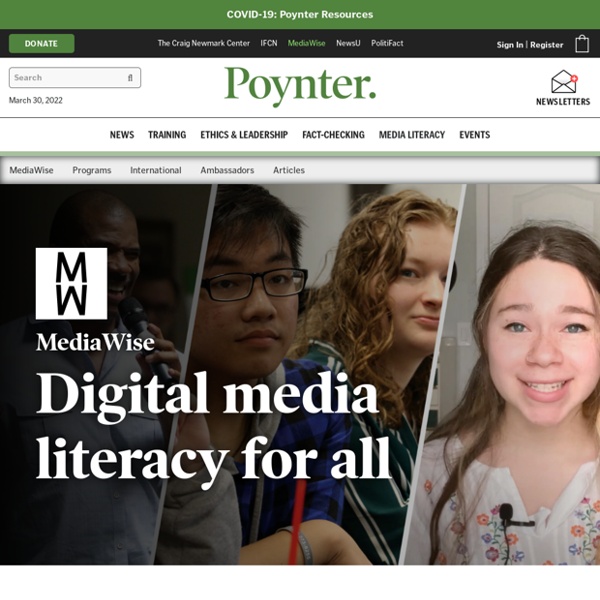



https://www.poynter.org/mediawise/
Related: Week 10: Credibility/Authority (*=Key reading) • Credibility Assessment Toolkit • Evaluating Sources / Fact-checking / Media Bias /NAMLE: Coronavirus Resources We’ve curated a collection of resources exclusively from our Organizational Partners designed to support educators, parents, and students during the pandemic lockdown. Misinformation Resources Coronavirus Misinformation Tracking Center NewsGuard’s new Coronavirus Misinformation Tracking Center ranks and lists news and information sites in the United States, United Kingdom, France, Italy, and Germany that have published false information about the virus. Get Smart about COVID-19 Misinformation As part of an effort to combat misinformation about COVID-19 and the new strain of coronavirus that causes it, the News Literacy Project created this resource page to provide accurate information about the pandemic and free resources to educators and the general public.
Filter bubble Template:Direct1 The term was coined by internet activist Eli Pariser circa 2010 (Technology such as social media) “lets you go off with like-minded people, so you're not mixing and sharing and understanding other points of view ... It's super important. It's turned out to be more of a problem than I, or many others, would have expected.” Concept[edit] PIL: information literacy in the age of algorithms: Student experiences with news and information, and the need for change Big Tech’s Pandemic Power Grab - The Atlantic In the years before the virus, critics began to prophesy that a handful of tech companies would soon grow more powerful than the government. Their scale and influence, and their ability to manipulate public opinion and shape markets, would permit them to reign unimpeded. That warning, however dark, didn’t quite capture the emerging strategy of these firms—a strategy that was in fact taking shape before the pandemic began—or the graver threat they pose. Rather than supplanting government, they have, in essence, sought to merge with it.
The Future of Fake News Adler presents a few new tools that seem pretty innocuous and even cool at first look. But when you think about how they might be used to spread misinformation, the ethical implications are concerning. Voco, an Adobe application still in development, promises to become “the Photoshop for speech.” After inputting a 40-minute recording of a person’s speech, the user can use a simple text editor to “write” an original and very convincing new recording in that person’s voice. In addition, new tech companies focused on facial re-enactment are getting closer to a tool that allows for realistic manipulation of a video of a person. In other words, you can take a video of someone giving a speech and change their expression and facial movements.
Students' Civic Online Reasoning Executive Summary The next presidential election is in our sights. Many high school students will be eligible to vote in 2020. Are these first-time voters better prepared to go online and discern fact from fiction? Overview In November 2016, the Stanford History Education Group released a study showing that young people lacked basic skills of digital evaluation. Not all scientific studies are created equal - David H. "A popular study from the 1970s that helps sell millions of dollars' worth of fish oil supplements worldwide is deeply flawed, according to a new study being published in the Canadian Journal of Cardiology. The original study, by Danish physicians H.O. Bang and D.J.
Misinfo Monday: Are Algorithms Feeding You Crap? (Look for others in this weekly Mozilla blog) Have you ever had a discussion with a family member or an old friend, and felt like they were living on a completely different planet? You know their world view is very different from yours but still, every fact or anecdote they give you seems...strange. Where did they hear all this crap? It might be because they’re consuming radically different content online than you are. Platforms like YouTube and Facebook use algorithms to decide what kind of videos and stories you’re most likely to enjoy based on past content you’ve watched or engaged with. Sometimes this can be harmless, like if Facebook decides you’re more likely to ❤️ a cat photo than a dog one.
YALSA Teen Literacies Toolkit Download the print version (PDF) or view the web version. Created by the Literacies Toolkit Resource Retreat Participants August 2017 About the Kit In this toolkit, we use the “fake news” phenomenon as an approach to addressing multiple literacies.